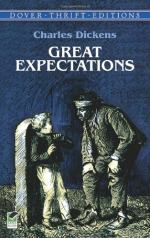Then, I said I supposed he had a fine business, and Wemmick said, “Ca-pi-tal!” Then I asked if there were many clerks? to which he replied:
“We don’t run much into clerks, because there’s only one Jaggers, and people won’t have him at second-hand. There are only four of us. Would you like to see ’em? You are one of us, as I may say.”
I accepted the offer. When Mr. Wemmick had put all the biscuit into the post, and had paid me my money from a cash-box in a safe, the key of which safe he kept somewhere down his back and produced from his coat-collar like an iron pigtail, we went up-stairs. The house was dark and shabby, and the greasy shoulders that had left their mark in Mr. Jaggers’s room, seemed to have been shuffling up and down the staircase for years. In the front first floor, a clerk who looked something between a publican and a rat-catcher — a large pale puffed swollen man — was attentively engaged with three or four people of shabby appearance, whom he treated as unceremoniously as everybody seemed to be treated who contributed to Mr. Jaggers’s coffers. “Getting evidence together,” said Mr. Wemmick, as we came out, “for the Bailey.”
In the room over that, a little flabby terrier of a clerk with dangling hair (his cropping seemed to have been forgotten when he was a puppy) was similarly engaged with a man with weak eyes, whom Mr. Wemmick presented to me as a smelter who kept his pot always boiling, and who would melt me anything I pleased — and who was in an excessive white-perspiration, as if he had been trying his art on himself. In a back room, a high-shouldered man with a face-ache tied up in dirty flannel, who was dressed in old black clothes that bore the appearance of having been waxed, was stooping over his work of making fair copies of the notes of the other two gentlemen, for Mr. Jaggers’s own use.
This was all the establishment. When we went down-stairs again, Wemmick led me into my guardian’s room, and said, “This you’ve seen already.”
“Pray,” said I, as the two odious casts with the twitchy leer upon them caught my sight again, “whose likenesses are those?”
“These?” said Wemmick, getting upon a chair, and blowing the dust off the horrible heads before bringing them down. “These are two celebrated ones. Famous clients of ours that got us a world of credit. This chap (why you must have come down in the night and been peeping into the inkstand, to get this blot upon your eyebrow, you old rascal!) murdered his master, and, considering that he wasn’t brought up to evidence, didn’t plan it badly.”
“Is it like him?” I asked, recoiling from the brute, as Wemmick spat upon his eyebrow and gave it a rub with his sleeve.
“Like him? It’s himself, you know. The cast was made in Newgate, directly after he was taken down. You had a particular fancy for me, hadn’t you, Old Artful?” said Wemmick. He then explained this affectionate apostrophe, by touching his brooch representing the lady and the weeping willow at the tomb with the urn upon it, and saying, “Had it made for me, express!”




